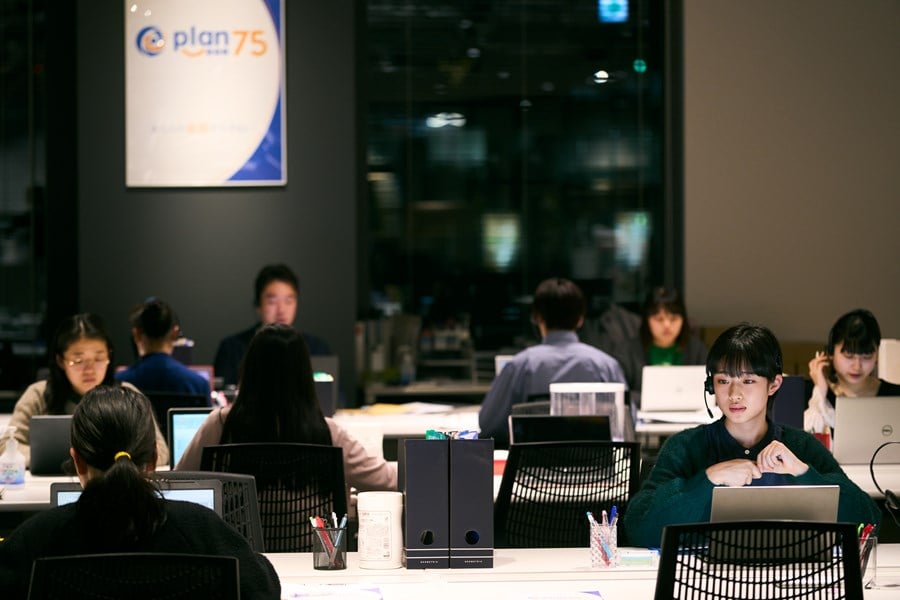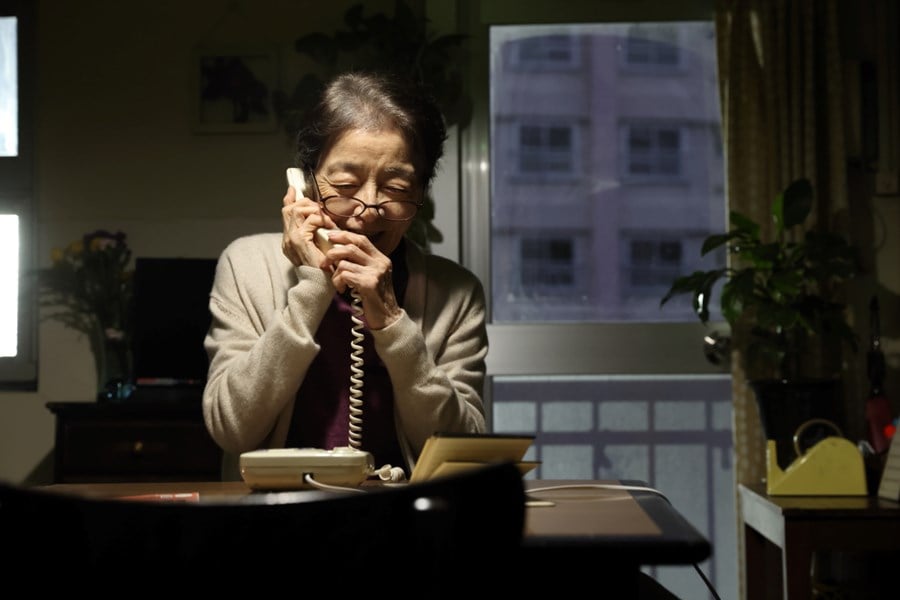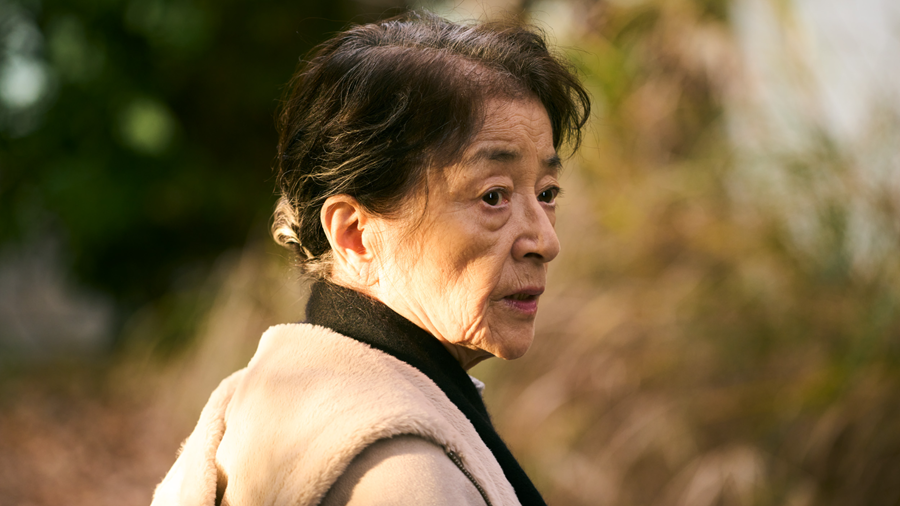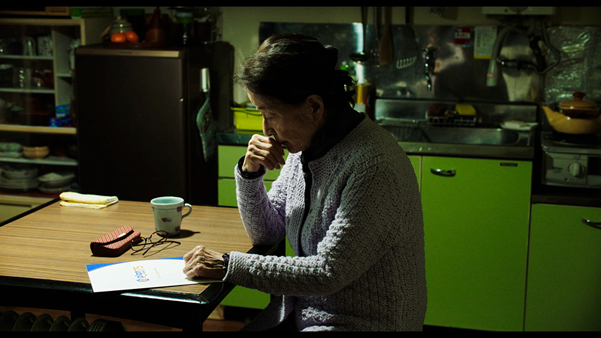Chie Hayakawa’s impressive feature debut continues a long cinematic tradition of regarding our world through the prism of science fiction, writes Ian Haydn Smith.

Everything you see in Plan 75 resembles the world we live in. Chie Hayakawa’s vision of a future society is neither a utopian ideal nor a dystopian nightmare. There are no spacecraft or colonised planets. Nor are there neon-soaked cityscapes, laser-armed weapons or revolutionary advances in AI or robotics. And yet, there is something uncannily off-kilter, yet feasible about this world.
Japan’s economy has been dramatically impacted by a disproportionately large elderly population and has enacted a radical law by which people over 75 are encouraged to opt for state-sponsored euthanasia. Upon signing up, applicants are assigned call-centre agents for guidance and support, receive a nominal cash bonus to spend as they wish, and are promised a painless end. Detailing the interaction of five characters, the film focuses on Mishi (a superb Chieko Baishô), a septuagenarian with no family who, after being fired from her job as a hotel cleaner – where she found friendship and company with similarly aged colleagues – struggles to make ends meet. Soon after losing her job, she is informed that her rented apartment is to be demolished. With nowhere and no one to turn to for support, she has little choice but to sign up for Plan 75. Yôko (Yumi Kawai), a young woman assigned to Mishi’s case, calls Mishi regularly to talk through her decision. Ironically, these calls are the only human connection Mishi has to look forward to, and soon finds herself growing attached to her new ‘friend’.

Plan 75 (2023)
Markedly, the film’s unsettling opening scene involves an act of violence not far off from what might appear on today’s newsfeed. A live performance of Mozart’s ‘Piano Sonata No 5 in G Minor’ accompanies a blurred long shot of a corridor, which becomes a close-up on a bloody hand holding a rifle. It’s the latest of many mass killings of older people by members of a younger generation who feel their lives, and the country’s resources, have been stolen by those who have lived too long. The killer’s voiceover reads his final letter, the justification of what he’s done, ‘The surplus of seniors is draining Japan’s economy… Surely the elderly don’t want to be a blight on our lives?’ This opening is bringing to the fore how certain extremist, violent factions of society have the potential to drive the political agenda.

Plan 75 (2023)
This opening contrasts with the beginnings of so many beloved sci-fi movies, which often revel in a wide view of the created worlds in which they’re set. From Fritz Lang’s futuristic Metropolis (1927) and Stanley Kubrick’s pre-man and orbital worlds in 2001: A Space Odyssey, to the overbuilt societies of Ridley Scott’s Blade Runner and the Mars of Paul Verhoeven’s Total Recall (1990), these films establish a re-imagined world of the future. Hayakawa’s opening recalls the glacial style of Michael Haneke, whose own foray into science fiction, The Time of the Wolf (2003), opens in a seemingly identical world to our own, only to turn it on its head through a similar act of violence. But where Haneke’s film develops into a bleak portrait of a post-apocalyptic world, Hayakawa’s drama takes an unexpected and subtle humanist turn. In this way, it’s more aligned with films like Andrei Tarkovsky’s Solaris and Douglas Trumbull’s Silent Running (both 1972) in the way human emotion informs the texture of a future world.

Ageing citizens and overpopulation have common currency in sci-fi cinema. Logan’s Run (1976) suggested that a future society could decide to end human life at 30 in order to avoid the overpopulation that previously resulted in the collapse of world order. In Children of Men (2006), a stunning adaptation of PD James’ novel, total human infertility means that the ageing population will be the last to ever exist. Plan 75 is no less narratively ambitious. However, alongside the cold, bureaucratic enactment of such a callous plan, we also see the emotional fallout – how this dystopian future affects real people and their everyday existence. It’s this warmth that provides the beating heart of the film, and in many ways bears a close resemblance to the style of Shoplifters (2019) and Broker (2022) writer-director Kore-eda Hirokazu; in particular, his earlier work, such as Maborosi (1995) and After Life (1997), which betray his past as a documentary filmmaker. Hayakawa has an equally subtle touch, and many of the film’s most moving moments feel more documented than dramatic.

Plan 75 (2023)
Plan 75 might be about the elderly of Japan, but the implications stretch to anyone society deems unproductive. There’s a quietness to the film, particularly in the way Hayakawa captures domestic routine, common daily activities shared by all human beings. Her film encourages us to reconsider whether we really want to value cold economic calculations over the richness and variety of the human experience.

PLAN 75 IS IN CINEMAS NOW
OR AVAILABLE ON CURZON HOME CINEMA




